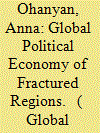| Srl | Item |
| 1 |
ID:
162018


|
|
|
|
|
| Summary/Abstract |
Despite ebbs and flows in comparative regional studies over the past few decades, the regional dimension of world politics is gaining sustained attention from scholarly and policymaking communities. Thus far much of the focus has been on regional integration, which is traditionally viewed as a necessary condition for economic development and security provision. This article describes the problem of regional fracture in conflict regions; it delineates the political and economic dimensions of regional fracture; and examines the security implications of each. It examines the problem of fractured regions in Russia’s post-Soviet neighborhoods, the Balkans, and sub-Saharan Africa. The article concludes with implications for security policy as exercised by the West in the post-American world.
|
|
|
|
|
|
|
|
|
|
|
|
|
|
|
|
| 2 |
ID:
117727


|
|
|
|
|
| Publication |
2012.
|
| Summary/Abstract |
Understanding the institutional identity (as opposed to the organizational one) of non-governmental organizations (NGOs) within structures of global governance is the main theme underpinning this work. Studies documenting the quantitative rise of the NGO sector in world politics have largely neglected the qualitative impact of that development. The institutional identity of NGOs is particularly important when considering the NGOs in light of the new links and relationships they have created with state-centric structures of world politics. To this end, this article offers network institutionalism as a theoretical tool to address that gap and to serve as a bridge between NGO studies and international relations (IR). In an effort to develop an institutional perspective on NGO studies, the article integrates network theories with historical and sociological strands of the new institutionalism. Building on this theoretical discussion, and after introducing the key assumptions of network institutionalism, it offers four broad clusters of research directions for further NGO studies as a way to think about future NGO studies in a more comprehensive manner while also stimulating new research directions that can strengthen the study of NGOs and the study of IR.
|
|
|
|
|
|
|
|
|
|
|
|
|
|
|
|
| 3 |
ID:
090958


|
|
|
|
|
| Publication |
2009.
|
| Summary/Abstract |
The challenge of orchestrating coordination and cooperation among the many international organizations active in international development has attracted much interest from academics and practitioners alike. This study addresses a particular piece of the larger puzzle: as nongovernmental organizations (NGOs) and their donors, each usually with much different policy orientations, coalesce within interorganizational networks, what determines whose policy preferences are pursued, implemented, and delivered on the ground? Within the network-based model of NGO behavior introduced in this article, certain attributes and the internal institutional composition of NGO-donor policy networks are significant determinants in shaping opportunities for NGOs and in giving both NGOs and donors leverage over the policy process. The model focuses specifically on demonstrating the effects of a network on NGO autonomy-that is, an NGO's ability to advance its own policy preferences regardless of their congruency with those of its donors. The network typology presented in this study identifies the comparative advantages of distinct network types in which the NGO is most empowered as an autonomous policy actor and is best equipped to withstand parochial donor preferences. Using network analysis and the proposed network-based model, this research takes the form of a comparative study of four NGO-donor policy networks from the postconflict microfinance sector in Bosnia and Herzegovina. The study also charts new research paths toward developing network-based approaches to the study of international institutions.
|
|
|
|
|
|
|
|
|
|
|
|
|
|
|
|
| 4 |
ID:
190283


|
|
|
|
|
| Summary/Abstract |
Since the collapse of the Soviet Union, US policy toward Russia has combined elements of principled pragmatism, selective engagement, and containment. This at times self-contradictory approach by successive US administrations has left the United States without a sustainable policy toward Russia, oscillating repeatedly between euphoria and despair. The Biden administration has inherited this approach and a poisonous partisan atmosphere in Washington. Thanks to President Trump’s fixation on “getting along” with Russian leader Vladimir Putin and the swirl of Russia-related investigations during his presidency, Russia policy became excessively personalized and de-institutionalized. The Biden team has indicated that they believe that the foundations of Russia policy needed a complete overhaul as well as a reappraisal of what has and has not worked since the Ukraine crisis erupted in 2014.
|
|
|
|
|
|
|
|
|
|
|
|
|
|
|
|